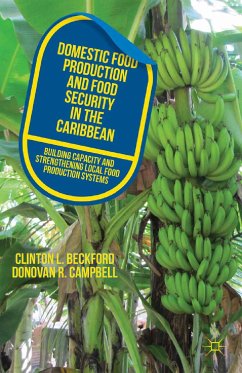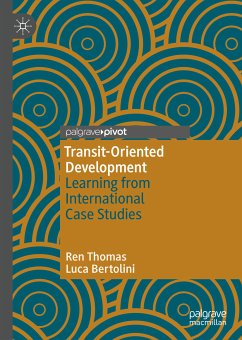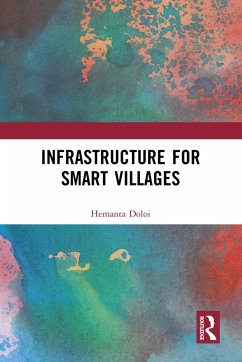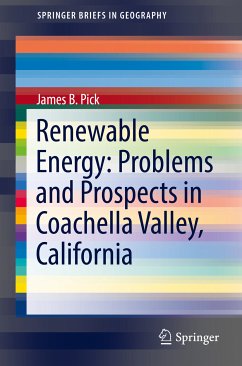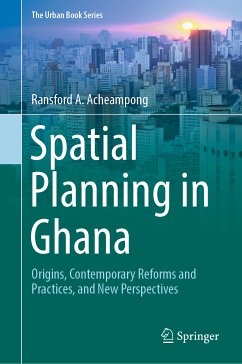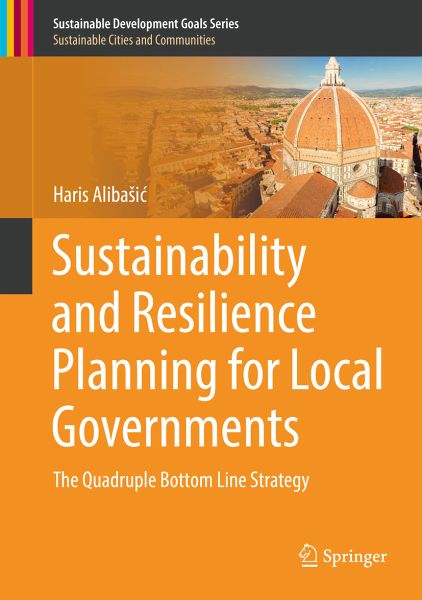
Sustainability and Resilience Planning for Local Governments (eBook, PDF)
The Quadruple Bottom Line Strategy
Versandkostenfrei!
Sofort per Download lieferbar
64,95 €
inkl. MwSt.
Weitere Ausgaben:

PAYBACK Punkte
32 °P sammeln!
This book details a process of creating a long-term sustainability and resilience plan for local governments to use in designing and implementing sustainability and resilience-related policies, initiatives, and programs. It offers guidance and methods in applying sustainability and resilience strategies to attain the prosperity of organizations and communities. The recommendations in this book are based on the author's years of experience in directing applied resilience and sustainability planning for a local government, and years of research covering diverse aspects of sustainability and resi...
This book details a process of creating a long-term sustainability and resilience plan for local governments to use in designing and implementing sustainability and resilience-related policies, initiatives, and programs. It offers guidance and methods in applying sustainability and resilience strategies to attain the prosperity of organizations and communities. The recommendations in this book are based on the author's years of experience in directing applied resilience and sustainability planning for a local government, and years of research covering diverse aspects of sustainability and resilience from climate change, climate preparedness and readiness, quadruple bottom line strategy, greenhouse gas emission reduction policies, climate adaptation and mitigation to sustainable energy policies and initiatives.
Chapter one defines terms related to sustainability and resilience and addresses how the topics reshape local governments and communities. Chapter two maps out the sustainability and resilience process for organizations and communities, determining the appropriate steps to be taken at each level of sustainability and resilience planning. Chapter three identifies community and organizational level engagement, with internal and external stakeholders, including designs necessary throughout these processes. Chapter four contains measuring, tracking, monitoring and reporting methods using the quadruple bottom line strategy, and developing a sustainability and resilience progress report to ensure accountability, transparency, and good governance. Then, chapter five details the implementation of a sustainability and resilience plan once it is established, describing potential programs and initiatives to achieve sustainable and resilient communities. Chapter six describes the intersection between sustainability and resilience, and chapter seven examines the tools and resources available to create a practical sustainability and resilience plan. Chaptereight concludes the text by addressing the future of sustainability and resilience, and complexities of the modern dynamics of the interconnected systems in cities, counties, and organizations, and recommends how local government administrators in their planning methods and strategies must consider these challenges.
Chapter one defines terms related to sustainability and resilience and addresses how the topics reshape local governments and communities. Chapter two maps out the sustainability and resilience process for organizations and communities, determining the appropriate steps to be taken at each level of sustainability and resilience planning. Chapter three identifies community and organizational level engagement, with internal and external stakeholders, including designs necessary throughout these processes. Chapter four contains measuring, tracking, monitoring and reporting methods using the quadruple bottom line strategy, and developing a sustainability and resilience progress report to ensure accountability, transparency, and good governance. Then, chapter five details the implementation of a sustainability and resilience plan once it is established, describing potential programs and initiatives to achieve sustainable and resilient communities. Chapter six describes the intersection between sustainability and resilience, and chapter seven examines the tools and resources available to create a practical sustainability and resilience plan. Chaptereight concludes the text by addressing the future of sustainability and resilience, and complexities of the modern dynamics of the interconnected systems in cities, counties, and organizations, and recommends how local government administrators in their planning methods and strategies must consider these challenges.
Dieser Download kann aus rechtlichen Gründen nur mit Rechnungsadresse in A, B, BG, CY, CZ, D, DK, EW, E, FIN, F, GR, HR, H, IRL, I, LT, L, LR, M, NL, PL, P, R, S, SLO, SK ausgeliefert werden.



